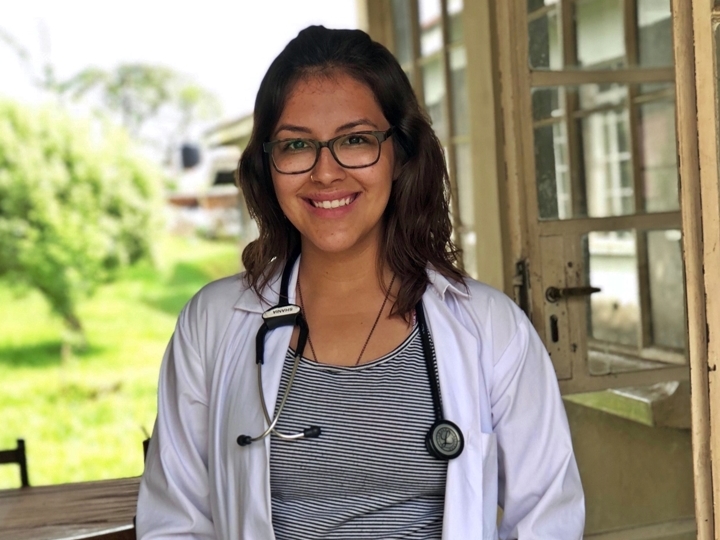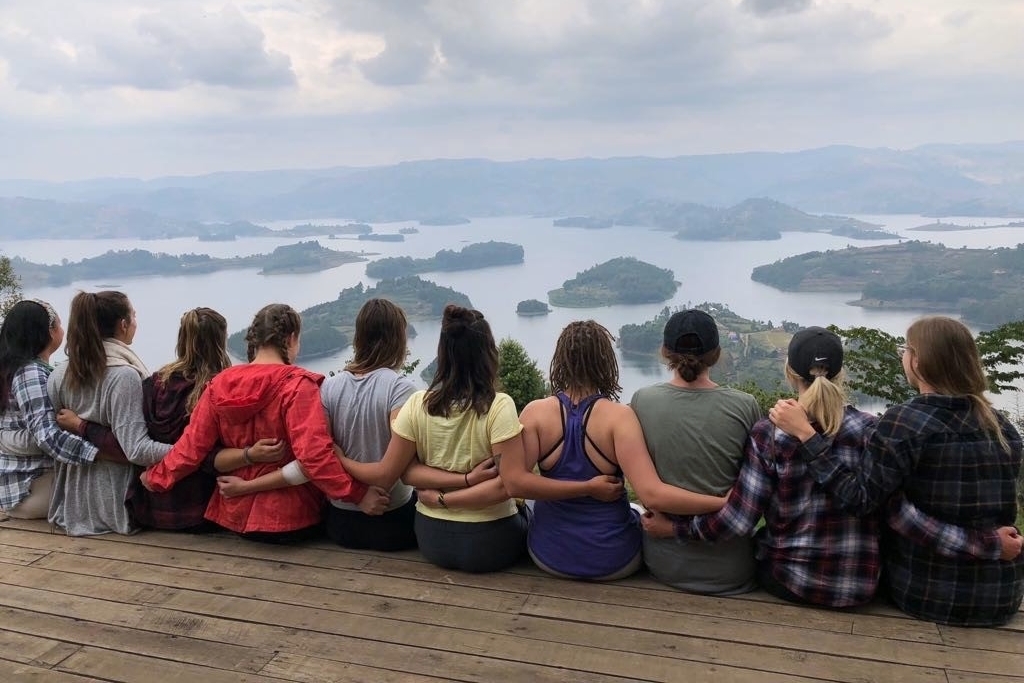
A Nurse’s Experience: From La Ronge, Saskatchewan to Uganda, Africa
Shania Petit (BSN'18) is a proud Métis woman, born and raised in Northern Saskatchewan reflects on her experience from La Ronge, Saskatchewan to Uganda, Africa.
Shania says she feels fortunate to have completed her Bachelor of Nursing (BSN) with USask College of Nursing at Northlands College in her hometown, La Ronge, Saskatchewan. Living in her home community meant Shania was able to stay with her support network, which helped her through the challenging times she encountered on her educational journey.
Shania shares with us her experiences of travelling to Uganda, Africa, to practise as a nurse. It was the first time she had lived and worked in a developing country.
Why did you go to Uganda?
I’ve always dreamt of travelling before I settle down to work in Northern Saskatchewan to see what being a nurse is like in other parts of the world.
In my third year of nursing, I took the opportunity to travel through a scholarship with the Northern Nursing Education Network (NNEN). I attended summer school in Tromsø, Norway, for two weeks. The theme was ‘Roots and Identity.’ I was one of eleven multinational-multicultural students from all over the Circumpolar North. During the program, we explored the similarities and differences between our cultures and healthcare practices. I enjoyed every moment of learning about other cultures while embracing my own.
Going to Norway was a huge stepping-stone for me. It forced me to leave my comfort zone. And I was able to explore the field of global health nursing to make sure I was genuinely interested in it. I realized that I love to travel, which was a big part of why I applied for the Queen Elizabeth Scholarship (QES), a three-month community-based international placement program in Uganda, Africa.
What was happening leading up to the trip?
I vividly remember the day I got the email. I read the first sentence. “Are you currently a healthcare student interested in international work?” I was instantly intrigued! I couldn’t think about anything else for weeks. I knew I had to give it a shot. At first, I was nervous because I had never been away from home for such a long time. But the excitement I felt outweighed my fears.
I was ecstatic when I received the news that I was one of ten USask scholars enrolled in a health science program to receive a scholarship!
We took three training sessions in Saskatoon before the trip. I was finishing my last year of nursing school and had completed my final practicum before departure. I was eager to discover what it was like to be a nurse in a developing country.

What was your experience as a nurse?
Leading up to the trip, I often imagined what it would be like to work as a nurse in Uganda. I tried to mentally prepare myself as best I could because I knew it wouldn’t be easy. Wh
I worked in a rural health centre in a small district called Rugazi, and in a bigger hospital in the city of Mbarara. So, I had two different perspectives of the public healthcare system.
I spent most of my time on the Paediatric unit. It’s an understatement to say that the working conditions were not optimal. The unit was desperately overcrowded, under-resourced and understaffed. It was heartbreaking. I often felt helpless. Day by day, though, I found it easier to be on the unit. I learned to make do with our meager resources.en I got there, I saw that it was incredibly different from what I was accustomed to.
The patients we cared for were very ill; they were admitted for conditions we rarely see in Canada - including malaria, malnourishment and sickle cell anemia. I was shocked when a measles outbreak happened while I was there. Measles is a highly contagious virus that can be easily prevented by vaccination.
Hospitals in Uganda employ a higher ratio of doctors to nurses than I am used to, and I spent most of my time shadowing doctors and performing nursing duties. I observed doctors undertaking what would be considered ‘nursing responsibilities’ on top of their diagnostic duties, which often doubled the time they needed to do their patient rounds. I made it my mission to help as much as possible, to offset their already extremely high-volume patient load.
What was your impression of the Ugandan health system?
It became evident to me that in Uganda a two-tier medical system operates with huge differences between the private and public sectors. I knew from my own experience that public government-funded healthcare facilities in Uganda are underfunded, under-resourced, short staffed and often, unsafe. I did not have the opportunity to tour a private hospital.
However, locals told me about the differences. Unlike the public system where I worked, private hospitals have the resources, staff, and means to provide high-quality care, similar to what we receive in Canada.
In terms of nursing, specifically, I strongly believe that Uganda could improve patient and population health if nurses were better utilized. In Uganda, nursing is still portrayed as a career only for women. My hope for the future is that these views will change and work will be done to strengthen the nursing role and recruit more nurses.
What were your impressions of Uganda, culturally?
The country itself and the Ugandan people are wonderful. Experiencing the culture made me more aware of my culture and taught me to respect theirs.
Many ethnic groups live in Uganda and they speak several different languages. And similar to my own culture, elders are highly respected. Uganda has a strong male dominant culture and women dress modestly. It would be rare to see Ugandan women in shorts or pants; so out of respect for the culture, we swapped our shorts and tanks for skirts and dresses.

How have your experiences in Uganda changed you?
It may be cliché, but it’s true - it was truly eye-opening to work as a nurse in a developing country.
I remember leaving the hospital feeling so defeated some days because of factors that were out of my control - things we take for granted every single day because we live in Canada: lack of clean drinking water, sanitation, and electricity, to name a few. So many of the things that we as Canadians view as necessities now hold somewhat less value to me.
This experience has given me a whole new perspective. I know going forward, it will have a positive impact on my nursing practice.
What did you do when you got back home?
When I returned from Uganda, I dedicated my time to study diligently for my national exam (NCLEX-RN). I am happy to say, I recently passed. I’m now on the path of beginning my career as a Registered Nurse in Saskatchewan.
Congratulations. Now that you are a nurse, what are your plans?
Global health is a newfound passion of mine. I will continue to pursue my dream of working as a nurse in other parts of the world. I highly encourage anyone who is even slightly interested in travel to go for it! When you step out of your comfort zone, the possibilities are limitless.
Mostly, I am looking forward to what the future holds!

